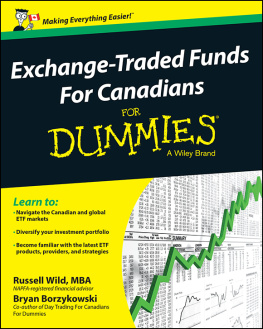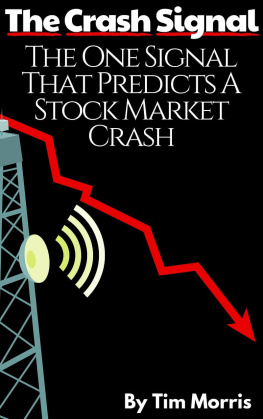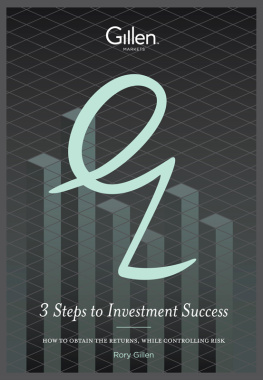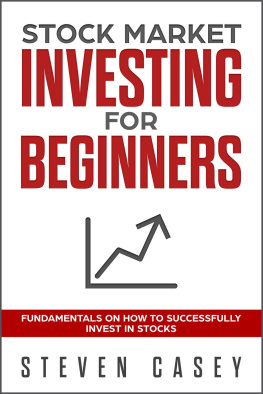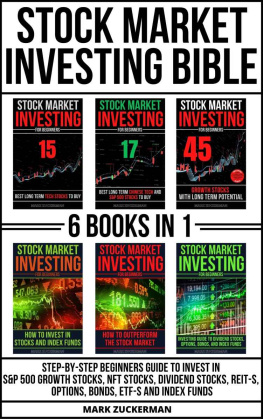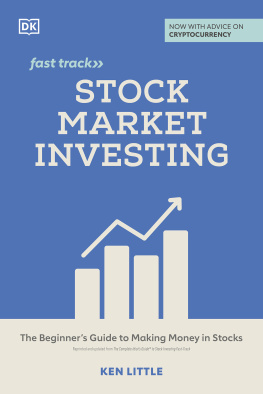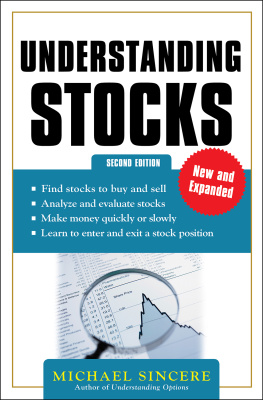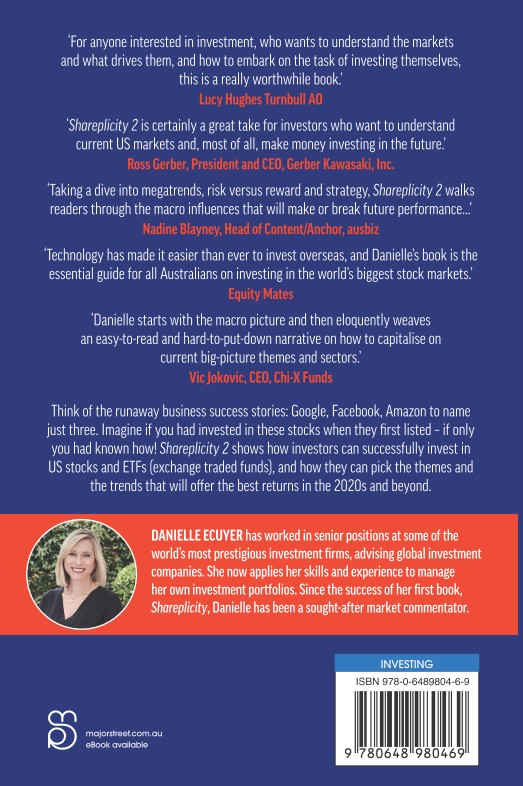Acronyms and abbreviations
| ADR | American Depository Receipts |
| AI | Artificial intelligence |
| AOFM | Australian Office of Financial Management |
| CAGR | Compound average growth rate |
| CBOE | Chicago Board Options Exchange |
| CPI | Consumer price index |
| DCF | Discounted cash flow |
| DJIA | Dow Jones Industrial Average |
| EBITDA | Earnings before interest, tax and depreciation or amortisation |
| ESG | Environmental, social, governance |
| ETF | Exchange traded fund |
| EV | Electric vehicle |
| EV-to-sales | Enterprise-value-to-sales |
| FAANMG | Facebook, Apple, Amazon, Netflix, Microsoft and Google |
| FOMO | Fear of missing out |
| FSD | Full self-driving |
| GARP | Growth at a reasonable price |
| GDP | Gross domestic product |
| HFT | High frequency trading |
| IaaS | Infrastructure-as-a-service |
| ICE | Internal combustion engine |
| ICMA | International Capital Market Association |
| IPO | Initial public offering |
| MSCI | Morgan Stanley Country Index |
| NYSE | New York Stock Exchange |
| OTC | Over the counter (trades) |
| PaaS | Platform-as-a-service |
| PER | Price-to-earnings ratio |
| QE | Quantitative easing |
| RBA | Reserve Bank of Australia |
| S&P | Standard & Poors |
| SaaS | Software-as-a-service |
| SEC | Securities and Exchange Commission |
| SPACs | Special purpose acquisition companies |
| SVOD | Subscription video on demand |
| TAM | Total addressable market |
| TIPs | Treasury inflation protected securities |
| yoy | Year-on-year |
About the author
Danielle Ecuyer pursued a successful career for 15 years in institutional equities stockbroking and wealth management after completing her Commerce degree at the University of New South Wales. She trained and worked as an Australian equities analyst for BZW Australia in Sydney, consolidating her knowledge of fundamental share analysis. In 1990, Danielle moved to London to work in institutional equities sales in global emerging markets and specialised wealth management. Here she was employed in senior positions at some of the worlds pre-eminent financial firms in the 1990s and looked after some of the worlds largest emerging market investors in a time of great change.
After retiring, Danielle became a full-time investor while raising her son, working for NGOs and pursuing other passions. With over four decades of successful domestic and international experience in share investing in both a professional and personal capacity, Danielle drew on her wealth of expertise and wisdom to write Shareplicity: a simple approach to share investing. Released during the global pandemic, Shareplicity quickly hit the bestsellers lists and stayed there for most of the year.
Shareplicity 2 is a response to calls for more information on gaining wider exposure to stocks on the US markets.
Danielles experiences of the investment world as an adviser and client allow her to bring a fresh and independent perspective to share investing. Shareplicity 2 aims to educate and inform both new and existing investors, challenge traditional views using extensive research from global expert commentators, and provide up-to-date data and information about what is happening in stock markets and 21st-century investment themes.
Its one thing to have a couple of good years of investing under your belt, yet another to survive and succeed over the long term. This was Danielles goal and one she has achieved. And you can too.
Ford versus Tesla
The movie
It is Hollywoods grandest night on the film calendar, the Oscars. There is so much excitement around the latest blockbuster from the Netflix stable, Ford versus Tesla.
The all-star cast is headed by Christian Bale who plays the enigmatic engineering genius Elon Musk. Rumour has it that this is one of Bales best performances, and the buzz is electric as the media and crowds wait for Bale and Musk to arrive in the latest self-driving Model S Plaid.
Netflix jumped at the opportunity to produce and distribute this David versus Goliath story of Mr Musks sustainable energy and transport company, which saved the world from climate catastrophe despite the legacy giants of the 20th century oil and the internal combustion engine (ICE) companies, as represented by the Ford Motor Company.
The tale covers the 30-year struggle and eventual victory of Tesla corporation to accelerate the worlds move to mass transport with electric vehicles (EVs), autonomous robotaxi fleets, semi-trailers and renewable energy systems and battery storage.
The almost cult-like, religious following Musk and Bale have means the Twittersphere is alight with anticipation of the awards ceremony, which is being live-streamed across the globe.
STOP! Hold it right there!
Whats all this talk about a new Netflix film? you ask. Danielle has lost the plot! There is no movie; there is no victory; there is no way one man and his vision can disrupt the US$11 trillion automotive and oil markets; its just not possible!
The reality
Yes, you are right, there is no movie yet. And the story, while 20 years in the making, is only just gathering momentum.
Now, before you become concerned that this chapter and the book are just a promotion for Tesla, I want you to take a deep breath and possibly a leap of readerly faith, and continue reading. As you will discover, the story is in the early stages, but it represents one of the most profound disruptive changes you and I will live through.
The story is equally important for appreciating the winds of changes blowing through the US stock markets and how you can invest to make the most of all the differing dynamics of the largest stock indices in the world.
Why the Ford versus Tesla story matters
The story of Ford versus Tesla or any other ICE manufacturer, such as General Motors (GM) or Volkswagen (VW) is
emblematic of the technological disruption and the change the world is experiencing.
Elon Musks vision to accelerate the development of sustainable energy was rooted in his concern that the world would reach peak oil. (This theory was viewed as probable until fracking became economically viable and the USA once again assumed the title of the worlds largest oil producer, with the shale oil discoveries in West Texas, Permian Basin.)
What started as a risk-adjusted strategy to produce EVs to offset declining oil production has transformed into a race to cease the worlds fossil-fuel dependence.
While some would frame the EV upstart as David versus the ICE Goliaths, the truth is somewhat different. Suppose the ultimate goal were to accelerate the worlds transition to sustainable energy and transport, as stated. In that case, the goal is on the first leg of achievement, given the flood of announcements from major car-manufacturing companies in late 2020 and early 2021 (Ford, GM, VW and Mini among them) that they would transition away from traditional combustion engines to zero emission technologies.
Next page

